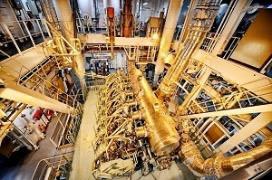
5 minute read
FROM THE EDITOR
from CSI Autumn 2021
by Maritime-AMC
IN IT FOR THE LONG HAUL
The maritime industry’s focus on meeting the demands of green legislation has continued to gather pace as we look at new methods, or extending methods that will hopefully improve everyone’s carbon footprint.
This has resulted on concentration on a wide range of alternative fuels, including hydrogen, ammonia and nuclear power, as operators seek to explore the alternatives to low sulphur fuels or fitting expensive scrubbing equipment.
It is not merely a question of a short term fix to meet legislative requirements, but the need to come up with long-term solutions that actually stick. At many times in the past, the maritime industries have been slow to respond to the demands of meeting the legislative requirements introduced and, in some cases, have been either caught out, or have concentrated on finding new uses for vessels that no longer meet requirements because of regulatory changes.
It is good to see a wide range of solutions to ecological problems on display in Clean Shipping International, but also successes in combatting such issues as transference of damaging organisms in ballast water, for example. One key point that needs to be considered is that it is not just a question of complying with new regulations and meeting the deadlines indicated, but of needing to make new equipment work efficiently in practice.
Regulatory compliance should never be a question of merely ticking the boxes and maritime industries have often been accused of not going the distance in coming up with solutions. Some short-term fixes have proved to be dangerous in the longer term, for example converting single hull tankers for use in other sectors of the industry, with structural changes affecting the safety and viability of the vessels concerned over a longer period.
It is also good to see that not only are companies coming up with new and innovative solutions to combatting climate change, but they are also deciding to band together to explore common approaches to the problem. Maritime experts need to ensure that lawmakers are aware of the level of expertise available within the maritime sphere, which often goes un-noticed.
The recent launch of the Maritime Professional Council in the UK is one initiative that is aimed at giving a push in this direction. In the interests of ensuring clean shipping for the future, we need not only to think outside the box but also ensure that our views are heard in all the right places.
At the same time, we need to consider the race to decarbonisation as an opportunity and not a headache. This edition shows some of the innovative approaches out there — and we hope that you enjoy reading about them.




THE SCRUBBER MAKER
PureteQ scrubber systems feature the lowest OPEX in the business and are easy to install. We have now simplified the installation further in our Generation II scrubber, which potentially will reduce the shipyard installation cost by double-digit percentage.
All scrubber systems come with state-of-the-art intuitive control systems with full remote accessibility. In times like these, it is very convenient to get 24/7 remote on-line support/ guidance to ship crews from certified Marine Engineers.
We are presently releasing a newly developed cloud-based software for optimizing of scrubber systems across fleet and scrubber makes. It features the measuring of MARPOL compliance, operational performance (impact on SFOC) as well as environmental performance reporting, such as CO2, Sulfur and PM reductions. The software will enable sharing of learnings between crews, resulting in lower energy consumption and other OPEX. The software is a perfect match to new IMO regulation on EED(X)I & CCI when well to wake principle applies.


Editor: Sandra Speares speares1@ aol.com Project Director: Jonathon Ferris Jonathon.ferris@ csi-newsonline.com Sub-editor: Samantha Robinson sam.robinson.journalist@ gmail.com Publisher: Bill Robinson publisher@ csi-newsonline.com Designer: Justin Ives justindesign@ live.co.uk
Published by Maritime AMC, Clean Shipping International supports Clean Shipping Initiatives.
The views expressed in Clean Shipping International are not necessarily those of Maritime AMC unless expressly stated as such and disclaim any responsibility for errors or omissions or their consequences or for advertisements contained in this magazine and has no legal responsibility to deal with them.
Distributed to the members of

CLEANSHIPPINGALLIANCE2020
1 FROM THE EDITOR
Why meeting new environmental regulations is a long-term effort
7 EGCSA

Don Gregory, Director, Exhaust Gas Cleaning Systems Association
9 ZESTAS
The Zero Emissions Ship Technology Association on a message of hope
10 INTERVIEW: YARA
CSI talks to Aleksander Askeland of Yara Marine Technologies

11 WORLD NEWS
From surveys to solar power, a look at new industry initiatives across the globe
17 EGCSs
The scrubbers segment faces a buoyant future, with expansion set to continue

30 VIEWPOINT
Laurent Leblanc Senior Vice President Technical and Operations, Bureau Veritas
35 SHIP TECHNOLOGY
Why the internal combustion engine offers a quicker way to meet targets
40 INTERVIEW: COREPOWER

CorePower has been working to provide alternative sources of power for vessels? » p9
» p17
» p40
» p52
43 BWTS
The tectonic shift in ballast water treatment system applications
45 BIOFUELS
A look at future fuels in the
rapidly evolving marine market
47 ALTERNATIVE FUELS
Recent initiatives that aim to help meet the new regulations
50 SATELLITES
How data-driven technologies can fast-track shipping’s decarbonisation
52 WIND ENERGY
Wind power can help the industry leave the fossil fuel era behind
55 DECARBONISATION
Focusing on the bigger picture will enable firms to move towards net zero
59 RECYCLING
Despite many challenges, scrapping is on the rise — but there are issues ahead
61 ALTERNATIVE FUELS
The recent Maritime AMC-organised Alternative Fuels virtual webinar
63 EVENTS
Upcoming not-to-be-missed CSI events









